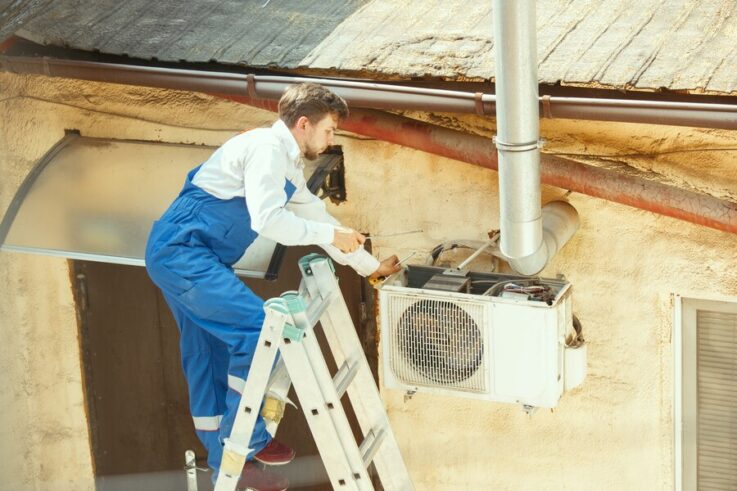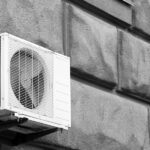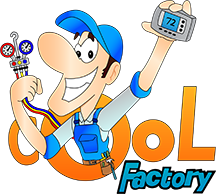
HVAC Repair Tips for Homeowners in Sterling
Keeping your home’s HVAC system in top condition is essential for maintaining a comfortable and energy-efficient living space. Whether you’re dealing with a sudden breakdown or performing routine maintenance, understanding some basic HVAC repair tips can save you time and money. In Sterling, where the climate can vary greatly, having a reliable heating and cooling system is crucial. This guide will provide practical advice on troubleshooting common issues and performing simple repairs, helping you extend the life of your HVAC system.
Understanding Your HVAC System
Understanding your HVAC system is crucial for effective maintenance and timely repairs. The HVAC system, which stands for Heating, Ventilation, and Air Conditioning, is composed of several components that work together to regulate indoor temperature and air quality. Familiarizing yourself with key parts like the thermostat, air filters, ductwork, and the outdoor unit can help you identify issues early on and communicate better with repair professionals.
Knowing how your HVAC system operates also empowers you to perform basic checks and preventive measures. Regularly inspecting and maintaining components like air filters and ducts can prevent minor problems from escalating into costly repairs. A well-maintained HVAC system not only ensures comfort but also improves energy efficiency, reducing your utility bills.
Signs Your HVAC System Needs Repair
Recognizing the early signs that your HVAC system needs repair can save you from inconvenient breakdowns and costly fixes. Here are four common indicators that your system requires professional attention:
- Unusual Noises: If you hear strange sounds like banging, clanking, or squealing coming from your HVAC system, it may indicate loose or damaged components that need immediate repair.
- Inconsistent Temperatures: When some rooms are too hot or too cold despite adjusting the thermostat, it could signal issues with the ductwork, thermostat, or the HVAC unit itself.
- Frequent Cycling: If your HVAC system frequently turns on and off, it may be experiencing problems with the thermostat, airflow, or internal components that require inspection and repair.
- Unpleasant Odors: Foul or musty smells emanating from your vents can be a sign of mold growth, burnt wires, or other serious issues within your HVAC system that need addressing.
Importance of Regular HVAC Maintenance
Regular HVAC maintenance is essential for ensuring the longevity and efficiency of your heating and cooling system. By scheduling routine check-ups, you can identify and address minor issues before they become major problems. This proactive approach not only helps prevent unexpected breakdowns but also keeps your system running smoothly, which can save you money on energy bills and expensive repairs.
In addition to cost savings, regular maintenance improves indoor air quality and ensures a comfortable living environment. Clean air filters, well-maintained ductwork, and properly functioning components reduce allergens and pollutants in your home. Investing in regular HVAC maintenance is a smart decision that enhances your system’s performance and provides peace of mind year-round.
How to Check and Replace Air Filters
Checking and replacing your HVAC air filters is a simple yet crucial task that helps maintain your system’s efficiency. To check the filter, locate the filter slot, usually near the return air duct or the blower compartment. Remove the filter and hold it up to the light. If you can’t see light through it or it appears dirty and clogged, it’s time for a replacement.
Replacing the air filter is straightforward. Purchase the correct size filter for your system, which is often marked on the old filter. Insert the new filter into the slot, ensuring the airflow arrows on the filter match the direction of the system’s airflow. Regularly replacing air filters every 1-3 months keeps your HVAC system running efficiently and improves indoor air quality.
Thermostat Troubleshooting Tips
A malfunctioning thermostat can lead to an uncomfortable home and inefficient HVAC operation. Here are four common thermostat issues and tips on how to troubleshoot them:
- Incorrect Temperature Readings: If your thermostat is displaying incorrect temperatures, try recalibrating it. Ensure it’s not placed near heat sources or in direct sunlight, which can affect its accuracy.
- No Response from the HVAC System: When your HVAC system doesn’t respond to thermostat settings, check the batteries. Replacing old batteries often resolves the issue. Also, inspect the wiring for any loose or damaged connections.
- Short Cycling: If your HVAC system frequently turns on and off, it might be due to a faulty thermostat. Ensure the thermostat is level and securely mounted, and consider resetting it to factory settings.
- Unresponsive Display: An unresponsive or blank thermostat display can indicate power issues. Check the circuit breaker and ensure the thermostat is properly connected to the power source. If the problem persists, the thermostat may need replacing.
Dealing with Unusual HVAC Noises
Unusual noises from your HVAC system can be alarming and often indicate underlying issues that need attention. Common sounds like banging, clanking, or rattling may suggest loose or broken components within the system. These noises can stem from issues such as a loose belt, motor problems, or debris caught in the blower.
Addressing these noises promptly is crucial to prevent further damage. Start by turning off the system and inspecting visible parts for loose or damaged components. If the source of the noise isn’t apparent or you’re unsure how to fix it, it’s best to call a professional HVAC technician. Timely intervention can save you from more costly repairs and ensure your system operates smoothly.
Maintaining Proper Airflow
Proper airflow is essential for the efficient operation of your HVAC system and maintaining a comfortable indoor environment. Here are four signs that your airflow may be compromised:
- Weak Airflow from Vents: If you notice a weak stream of air coming from your vents, it could be due to a clogged air filter, obstructed ductwork, or issues with the blower motor.
- Hot and Cold Spots: Uneven temperatures in different rooms indicate poor airflow. This could be caused by blocked vents, leaky ducts, or an improperly sized HVAC system.
- Increased Energy Bills: A sudden spike in your energy bills can be a sign of restricted airflow. When airflow is compromised, your HVAC system has to work harder, consuming more energy.
- Unusual Noises: Whistling or hissing sounds from your HVAC system can signal airflow problems, such as duct leaks or blockages. Addressing these issues promptly helps maintain optimal system performance and efficiency.
Checking Refrigerant Levels
Checking refrigerant levels in your HVAC system is essential for its efficient operation and longevity. Low refrigerant levels can lead to poor cooling performance and increased energy consumption. To check the levels, first ensure the system is off and locate the refrigerant lines. Use a gauge set to measure the pressure in the lines, comparing the readings to the manufacturer’s specifications for your system.
If the refrigerant levels are low, it often indicates a leak, as refrigerant does not deplete over time like fuel. Detecting and repairing leaks requires professional expertise, so it’s best to call a certified HVAC technician. Proper refrigerant levels are crucial for optimal cooling performance and preventing potential damage to your HVAC system.
Cleaning HVAC Coils
Cleaning your HVAC coils is a vital maintenance task that helps ensure efficient system performance. Dirty coils can lead to reduced cooling capacity and increased energy consumption. To clean the coils, first, turn off the HVAC system. Locate the evaporator coils inside the indoor unit and the condenser coils in the outdoor unit. Using a soft brush, gently remove any debris and dirt from the coils’ surface.
For a deeper clean, apply a coil cleaner spray, following the manufacturer’s instructions. Rinse the coils thoroughly with water and allow them to dry completely before turning the system back on. Regularly cleaning your HVAC coils not only improves airflow and cooling efficiency but also extends the lifespan of your system, saving you money on repairs and energy bills.
Inspecting and Cleaning Ductwork
Inspecting and cleaning your ductwork is essential for maintaining good indoor air quality and ensuring your HVAC system operates efficiently. Begin by visually inspecting the ducts for signs of dust buildup, mold, or pests. Check for any loose connections or leaks that could reduce airflow and efficiency.
To clean the ductwork, start by removing vent covers and vacuuming the ducts using a high-powered vacuum with a brush attachment. For deeper cleaning, consider hiring a professional duct cleaning service to ensure all contaminants are thoroughly removed. Regular inspection and cleaning of your ductwork help prevent respiratory issues, improve system performance, and can even lower your energy bills by promoting better airflow throughout your home.
Outdoor Unit Maintenance Tips
Proper maintenance of your HVAC outdoor unit is crucial for optimal performance and longevity. Here are some essential tips to keep your outdoor unit in top condition:
- Clear Debris Regularly: Ensure the area around the outdoor unit is free from leaves, grass, and other debris. This helps maintain proper airflow and prevents the unit from overheating.
- Check and Clean the Fins: Inspect the unit’s fins for any damage or dirt buildup. Use a gentle brush to clean them and a fin comb to straighten any bent fins for efficient airflow.
- Inspect the Condenser Coils: Regularly check the condenser coils for dirt and grime. Clean them with a coil cleaner spray and rinse thoroughly to improve the unit’s efficiency.
- Level the Unit: Ensure the outdoor unit is level. An uneven unit can cause the compressor to work harder, leading to increased wear and tear. Adjust the unit’s position if necessary to maintain its efficiency.
Keeping your HVAC system in top condition is essential for maintaining comfort and efficiency in your home. By following these HVAC repair tips, you can address common issues and ensure your system runs smoothly year-round. For professional assistance and more complex repairs, trust the experts at Cool Factory, Inc.
Our experienced technicians are ready to help you with all your HVAC repair needs. Contact us today at (703) 713-5113 to schedule an appointment or visit us in Sterling, VA. Your comfort is our priority, and we’re here to keep your HVAC system running efficiently.






